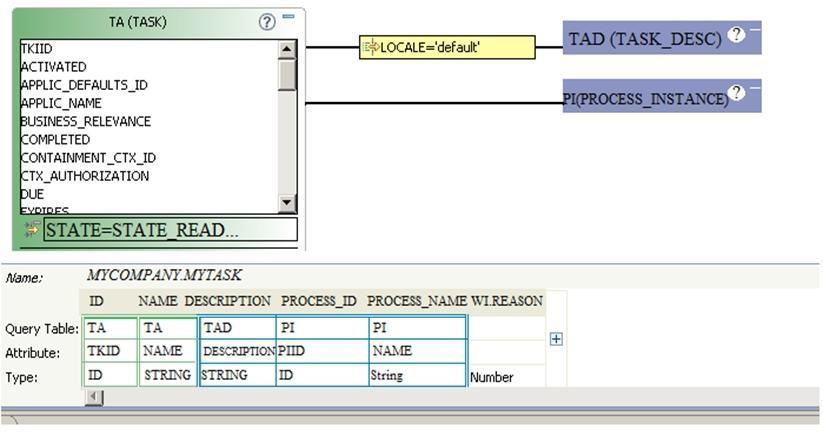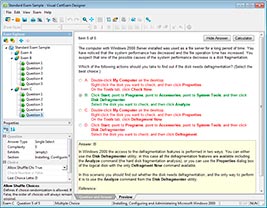Download IBM Business Process Manager Advanced V8.0 Integration Development.C9550-273.VCEplus.2019-10-01.53q.vcex
| Vendor: | IBM |
| Exam Code: | C9550-273 |
| Exam Name: | IBM Business Process Manager Advanced V8.0 Integration Development |
| Date: | Oct 01, 2019 |
| File Size: | 2 MB |
How to open VCEX files?
Files with VCEX extension can be opened by ProfExam Simulator.
Discount: 20%
Demo Questions
Question 1
An integration developer is implementing a query table to provide flexibility and performance in an integration solution.
Refer to the exhibit:

What should the integration developer consider when implementing this solution?
- TA (TASK) table is an attached query table.
- MYCOMPANY.MYTASK is the primary query table.
- Queries using this query table will return task instances even if they are not associated with a process instance.
- The query table definition file that is installed with the product needs to be customized by using predefined tables in the Business Process Choreographer database schema.
Correct answer: C
Question 2
An integration developer needs to ensure that instances of a BPEL process are only started by administrative users.
What does the integration developer need to do to meet this requirement?
- Use an administration task in the BPEL process and assign the Administrator role to those users.
- Use an administration task in the BPEL process and assign the Potential Starters role to those users.
- Use an inline invocation task in each initiating receive operation and assign the Potential Owners role to those users.
- Use an inline invocation task in each initiating receive operation and assign the Potential Starters role to those users.
Correct answer: D
Question 3
An integration developer needs to implement escalations for tasks that are not completed on time in an integration solution.

Which behavior can the integration developer expect with the above implementation? (Choose two.)
- Escalation 2 will not be thrown if Escalation 1 executes.
- Escalation 2 is thrown when the task moves to claimed state.
- If Escalation 2 is thrown, it will occur before Escalation 1 is thrown.
- If Escalation 1 is thrown, it will occur before Escalation 2 is thrown.
- Escalation 1 is thrown when the task does not move to claimed state within the specified duration.
Correct answer: DE
Question 4
An integration developer is planning to create a business process for a customer that will support their hiring procedures. There is a requirement for the business process to allow hiring managers to review submitted resumes before making any personnel decisions. The hiring manager must also be allowed to send resumes to other managers and to collect all of the recommendations before making a final decision. The integration developer has decided to use BPEL for the process implementation along with a human task for the manager reviews.
What approach should the integration developer take while implementing the human tasks?
The integration developer should create a human task that supports:
- subtasks, but avoid the auto-deletions settings because they are not supported for subtasks
- subtasks, and define escalations only for the parent task because the subtasks cannot have their own escalations.
- follow-on tasks, and ensure that the output message types of each of the follow-on tasks is identical to that of the parent task.
- follow-on tasks, but avoid taking steps to delete the tasks because follow-on tasks are automatically deleted when their parent task is deleted.
Correct answer: A
Question 5
An integration developer needs to implement a human task in an integration solution.
If reusability is a priority, then the integration developer should develop:
- a collaboration task, since it can be a parent task.
- an administration task, since it is a reusable activity.
- a to-do task, since it has access to the process context.
- an invocation task, since it can be attached to a process.
Correct answer: A
Question 6
An integration developer is modeling a human interaction and is trying to decide what type of human task to use.
What advice should be given to the integration developer when considering using an in-line human task?
The integration developer should select the in-line human task if the task:
- needs to call other services.
- provides just another service.
- needs access to process related information.
- will eventually be called as an SCA module in the future.
Correct answer: C
Question 7
An integration developer is asked to implement a BPEL process which continues its execution even after invoking another SCA component, and the component notifies the process when the response is ready.
Which invocation style must the integration developer choose to implement the requirement?
- Synchronous two way
- Asynchronous one way
- Asynchronous Deferred Response
- Asynchronous Request with Call back
Correct answer: D
Question 8
An integration developer wants to use an SCA invocation style where the client invokes a service and continues processing. At a later time, the client makes a request to capture the response.
Which invocation style should the integration developer use to implement this logic?
- Synchronous
- Asynchronous with callback
- Asynchronous using one-way
- Asynchronous with deferred response
Correct answer: D
Question 9
An integration developer must invoke a native HTTP application over a secured transport channel and use a custom data binding to convert data from ServiceDataObject to HTTP.
How does the integration developer achieve this?
Use a:
- SOAP/HTTP import.
- HTTP export with custom data binding.
- HTTP import with custom data binding.
- HTTP import with an authentication alias and custom data binding.
Correct answer: D
Question 10
An integration developer needs to implement a business process that will be invoked when a file is written to a specified directory.
What action should the integration developer take while configuring the WebSphere Adapter for Flat Files?
Configure an:
- inbound adapter specifying an event directory and an event table.
- inbound adapter specifying an event directory or an event table, depending on the availability of a database.
- outbound adapter specifying only an event table for polling incoming files.
- outbound adapter specifying only an event directory for polling incoming files.
Correct answer: A
HOW TO OPEN VCE FILES
Use VCE Exam Simulator to open VCE files

HOW TO OPEN VCEX AND EXAM FILES
Use ProfExam Simulator to open VCEX and EXAM files


ProfExam at a 20% markdown
You have the opportunity to purchase ProfExam at a 20% reduced price
Get Now!



